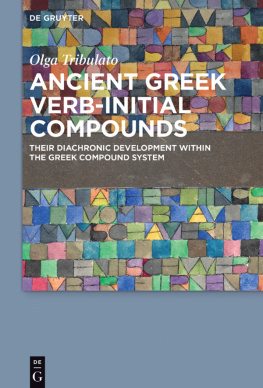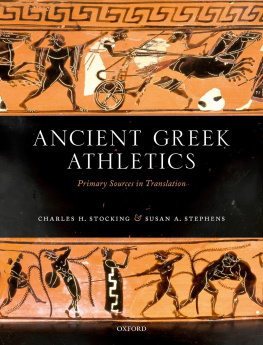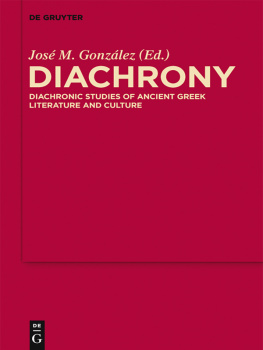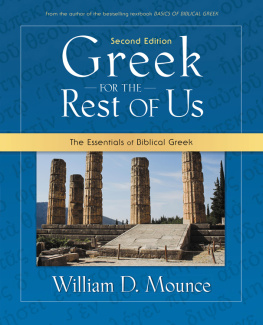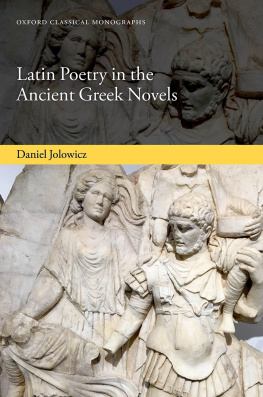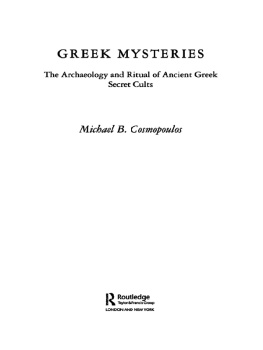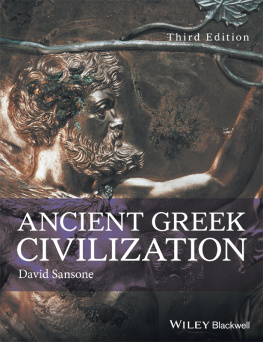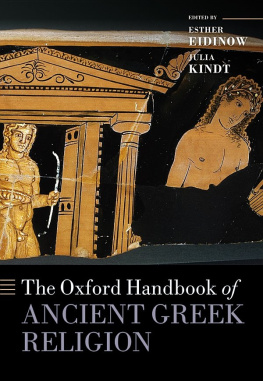Contents

Olga Tribulato
Ancient Greek Verb-Initial Compounds

ISBN 978-3-11-041576-6
e-ISBN (PDF) 978-3-11-041582-7
e-ISBN (EPUB) 978-3-11-041586-5
Library of Congress Cataloging-in-Publication Data
A CIP catalog record for this book has been applied for at the Library of Congress.
Bibliografische Information der Deutschen Nationalbibliothek
The Deutsche Nationalbibliothek lists this publication in the Deutsche Nationalbibliographie; detailed bibliographic data are available in the Internet at http://dnb.dnb.de .
2015 Walter de Gruyter GmbH, Berlin/Boston
Umschlagabbildung: Paul Klee: Einst dem Grau der Nacht enttaucht , 1918, 17. Aquarell, Feder und Bleistift auf Papier auf Karton. 22,6 x 15,8 cm. Zentrum Paul Klee, Bern.
Typesetting: Dr. Rainer Ostermann, Mnchen
www.degruyter.com
This book is for Arturo, who has waited so long.
Preface and Acknowledgements
I have always been , a late-bloomer, and this book is a testament to it. It began as one of the chapters of my PhD dissertation, submitted to the University of Cambridge in 2005. That thesis addressed topics in dialectal and structural variation in Ancient Greek compounding, with a focus on epigraphic sources: the study of verbal compounds was only a small part of the work. If it has taken me ten years to finally put the word end to this research, it is mostly because the topic of structural variation which my thesis addressed in a very tentative and inexperienced mannerrequired the kind of attention and in-depth analysis which it was not possible to provide in one chapter or in a series of articles. And yet, for all its length, this book is only a chapter itself: it focuses on Greek verb-initial compounds in their interaction with the more pervasive verb-final compounds, but it leaves out other important topics in the structure of compound types and their interaction with one another. My hope is that those who read the book and find it useful may embark on a similar study of other Greek compound categories.
The stimulus to work on the compounds of Ancient Greek came from my Cambridge M.Phil. and Ph.D. supervisor, Torsten Meissner, who taught me Mycenaean Greek and steered my work with matchless patience and good nature: it is a pleasure to record him first in this long list of acknowledgements. That research was generously funded by many institutions: I am grateful to the Faculty of Classics of Cambridge University, the Arts and Humanities Research Board, the Gates Cambridge Trust, and Pembroke College Cambridge for their financial and material support.
The idea that, in order to understand Greek verb-initial compounds, I had to compare them to the morphology of verb-final formations materialized one gloomy afternoon in Cologne, during a stay at the Institut fr Linguistik und Historisch-Vergleichende Sprachwissenschaft. I thank Prof. Dr. J. L. Garca Ramn for the frank talks we had back in 2002. Although he is in no way responsible for what I have written here, I hope that he will appreciate that I stuck to the task that seemed so daunting at the time.
Crucial criticism and eye-opening comments came from my thesis examiners, Jrgen Uhlich and Geoff Horrocks; the latter also provided advice on morphological matters and very kind support at various points in my career, and so did James Clackson with his characteristic generosity and directness. My research on compounding has greatly benefited from talks with Benedicte Nielsen (a fellow compound-addict), Ollie Simkin (the most knowledgeable and patient person on earth), Io Manolessou, and Antonietta Bisetto, all of whom have kindly put their expertise at my disposal.
This would have been a very different book had several people and institutions not given me the invaluable opportunity to broaden my understanding of many fields of Classical studies and Linguistics in the years that followed my doctorate. In 2005 St Johns College Oxford elected me to the Woodhouse Junior Research Fellowship, which gave me time and refreshing freedom to explore other fields of research, including bilingualism, ancient Sicily, comparative religion and (albeit very briefly!) Lithuanian morphology. In this book I have made use of some of my published articles which were written during my JRF at St Johns (Tribulato 2006, 2007 and 2010).
By appointing me to a temporary lectureship in Philology and Linguistics in 2007 the Faculty of Classics of the University of Cambridge and Pembroke College Cambridge gave me my first insight into the difficult job of teaching and putting across my thoughts clearly. My dear friend Laura Rossi enabled me to work as an editor for a whilean experience which has taught me about writing and research as well; I am grateful to her for always being on my side throughout the years. Most recently, Italys Ministero dellUniversit, dellIstruzione e della Ricerca, which elected me to a Rita Levi Montalcini research fellowship in 2010, has enabled me to learn lots about Greek lexicography, philology and literary dialects whilst enjoying the privilege of living in Venice. Here I have been very lucky in having the support and affection of Willy Cingano and Caterina Carpinato, who have helped me find my way in a new place. The Dipartimento di Studi Umanistici at Ca Foscari University has enabled me to test my ideas on language and literature on their students, who are an integral part of my learning path.
The preparation of the final manuscript of this book benefited from the insightful comments of two referees, the revisions of Michael Carroll and Rachel Barritt Costa, and the careful checks of my heroic assistant, Elisa Criveller; in a period of great stress, she was a veritable haven of serenity and deserves my most heart-felt thanks. Serena Pirrotta, Senior Editor at De Gruyter, also made a huge difference for the final delivery of this project, which she supported from day one with enthusiasm, competence and patience: working with her and her staff at De Gruyter has proven a most rewarding experience.
I have incurred more than one professional and personal debt with Andreas Willi, who has helped me in several ways throughout the years, and always with the intellectual generosity and great humanity which are unique to him. Albio Cesare Cassio has had a huge impact on my development as a scholar and teacher: his example is a constant source of inspiration.
In Cambridge and elsewhere Max and Claudia Sternberg, Vito Tagarielli, Jo Willmott and Marta Zlati made sure that I had warm food, good friends and a home no matter where I actually lived. Lucia Prauscello has showered me with all her kindness, acumen and inexhaustible energy throughout. Without her, I would have stopped writing this book at several stages: I am profoundly grateful for her friendship. In the final stages of the book, Marta Cardin, Valentina Copat, Silvia Ferrara, Stefania De Vido and Luca Mondin provided daily cheer and encouragement. I owe all of them more than I can express in a short sentencethey know how important they have been in these last months.
However, I would have never been able to work the way I did without the unfailing and loving support of my extended family and of Sergio in particular, who has showed me the way in the refined art of among many other things. Above all, I wish to thank two great women, Rosalba and Stefania: without their practical and moral backing, this book would have never happened. I thank them from the bottom of my heart.
Contents

